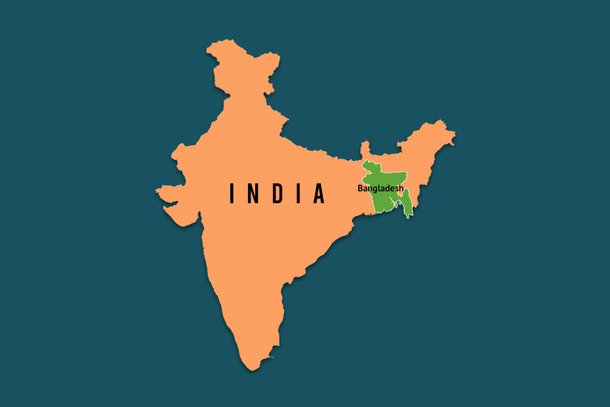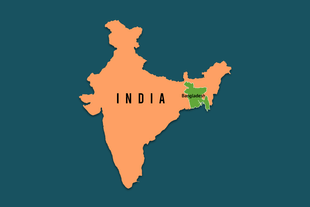World
India Must Draw Clear Red Lines For The New Regime In Bangladesh
Jaideep Mazumdar
Sep 14, 2024, 10:04 AM | Updated Sep 20, 2024, 05:43 PM IST
Save & read from anywhere!
Bookmark stories for easy access on any device or the Swarajya app.


The new dispensation in Bangladesh under Mohammad Yunus and elements closely aligned with it have been making hostile noises against India over the past month.
While New Delhi has firmly handled the issue of attacks on Hindus in Bangladesh and told Dhaka in no uncertain terms that such attacks are unacceptable, it must now draw clear red lines to the neighbours who have started feeling adventurous.
The primary red lines that New Delhi must draw and emphasise that they (the lines) must not be crossed are:
Extradition of Sheikh Hasina is off the table
In recent weeks, a number of members of the ruling dispensation in Bangladesh have been demanding the extradition of Sheikh Hasina, who has taken shelter in India.
They are citing the India-Bangladesh Extradition Treaty of 2013 (signed when Hasina was in power) that lays down extradition of people charged with serious crimes.
Though External Affairs Minister S Jaishankar has said that such demands will be dealt with diplomatically, New Delhi must publicly tell Dhaka that Hasina will not be extradited and reiteration of demands for her extradition would be harmful for bilateral ties.
The 2013 Treaty has a provision [Article 8(1)(a)(iii)] that provides for non-extradition of a person on the grounds that it would be “unjust or oppressive” to extradite the person because the accusations against the person “have not been made in good faith and in the interests of justice.”
It is clear that the charges of murder, mass killings, and genocide being levelled against Hasina are unjust, and she won’t face a fair trial if she is extradited to Bangladesh.
India has to refuse extradition on these grounds, and its intention to continue providing shelter to Hasina should be communicated to Dhaka very clearly even before a formal extradition request is made.
Privately and at the diplomatic level, officials of India’s Ministry of External Affairs (MEA) should tell their counterparts in Dhaka that Hasina has been a longstanding friend of India and India will not ditch its friend.
Encouraging anti-India Islamists will be considered a ‘hostile’ act
It is no secret that radical Islamists, all of them anti-India and pro-Pakistan, have become powerful after the overthrow of Hasina. In fact, the latest reports out of Bangladesh suggest that radical Islamists have infiltrated the current power structure and are wielding direct influence over government policies and actions.
Yunus, dependent for his survival in power on the pro-Islamist Bangladesh Nationalist Party (BNP) and also the Jamaat-e-Islami Bangladesh, is unable to stem the rise of Islamists in his country.
These Islamists, and even leaders of the students’ movement that overthrew Hasina from power, have been making anti-India statements, including preposterous ones calling for the choking of the ‘chicken’s neck’ corridor in Bengal that connects Northeast India with the rest of the country.
Hardcore Islamist radicals accused of terrorism, like Jashimuddin Rahmani (chief of the Ansarullah Bangla Team, a terror group), have been freed from prison, and they’re indulging in anti-India activities.
Dhaka must be told in unequivocal terms that the new government must crack down on Islamists and stop them from indulging in anti-India activities. Failure to do so would have grave consequences and lead to India reserving its right to respond unilaterally against such elements.
Border transgressions will not be tolerated
The new dispensation is using the Border Security Force's (BSF) actions against Bangladeshis indulging in cross-border smuggling or breaching the border as a stick to beat India with.
This has been a sore issue with Bangladeshis who feel they have the right to cross over to India at will and, when challenged or stopped by the BSF, retaliate and attack them. The BSF is expected to simply watch when border transgressions by Bangladeshis take place.
New Delhi must tell Dhaka that enough is enough and no more incursions of the border by Bangladeshi smugglers or infiltrators will be allowed. Breaching the border will be considered a hostile act and will be met with an appropriate response.
International borders across the world are sacrosanct and cannot be breached; doing so invites retaliatory and lethal action. Dhaka must be told about this clearly.
Bangladesh should be told that it is up to its border guards (the Border Guard Bangladesh, or BGB) to ensure that its citizens do not cross the border at any cost, and the BGB must bear responsibility if Bangladeshis are killed or injured by the BSF while trying to breach the border.
Allowing Pakistan to use Bangladesh for anti-India activities will not be tolerated
In the past, under BNP-Jamaat regimes and military juntas, Pakistan was allowed to carry on various anti-India activities, including training and arming cadres of militant outfits of Northeast India, from Bangladesh.
All that stopped when Hasina came to power and threw Pakistani elements out of the country, nabbed and handed over Northeast militants to India, and jailed Islamists.
Many, including BNP-Jamaat leaders, Islamists, and even student leaders (who are actually a front for Islamists), have started establishing contacts with Islamabad and are speaking of allowing Pakistan a free hand to create trouble in Northeast India from Bangladesh.
Dhaka must be told that this will not be tolerated at any cost. India of that era is not the India of now; the country has developed robust capabilities to neutralise threats from across the border.
Bangladesh must be told that if it allows Pakistan to use Bangladeshi territory to carry out anti-India activities, India will reserve the right to respond punitively. And that may cause severe embarrassment to Bangladesh.
Dhaka must bear in mind that keeping its pro-Pakistan Islamists in check and restricting them from indulging in anti-India activities or anything that is detrimental to India’s interests is its (Dhaka’s) responsibility.
SAARC will not be revived
Since assuming power, Yunus has called for the revival of the South Asian Association for Regional Cooperation (SAARC), which has been in limbo due to New Delhi’s refusal to engage with Pakistan over Islamabad’s use of terror as state policy and exporting terror to India.
Yunus and other Bangladeshi leaders are playing Pakistan’s tune and calling for revival of SAARC, which New Delhi clearly does not want.
New Delhi has forged new multilateral forums like the 'Bangladesh, Bhutan, India, Nepal' (BBIN) initiative, which include South Asian nations minus Pakistan.
Dhaka has to realise that it can ill-afford to play truant and advocate Pakistan’s cause with New Delhi. Doing so will have adverse consequences and be considered unfriendly by India.
So Yunus and his team should drop the idea of SAARC and strengthen engagement with the partners of alternate regional groupings like the BBIN and the Bay of Bengal Initiative for Multi-Sectoral Technical and Economic Cooperation (BIMSTEC).
Agreements on trade and transit links must be honoured
The BNP, Jamaat-e-Islami, Bangladesh’s radical Islamists, sections of the foreign policy establishment, and military and civil society leaders who are Islamists have been asking for scrapping of all India-Bangladesh trade and transit agreements signed when Hasina was in power. They contend that such agreements are one-sided and favour India when that is not the case.
The false propaganda against these agreements must stop, and any attempt by Dhaka to unilaterally abrogate these treaties will not be taken kindly by New Delhi.
Dhaka must be told that if it scraps such agreements and either denies India transit for movement of goods through its territory or refuses to provide security during such transit, it will have to face punitive actions.
The balance of power and trade is in India’s favour, and India will not shy away from leveraging its advantages to punish Dhaka for harming Indian interests.
Playing India against China or Pakistan is futile
Dhaka, as recent pronouncements by members of the ruling dispensation there have indicated, may be tempted to indulge in diplomatic misadventure by trying to play China and Pakistan against India.
MEA officials must tell their counterparts in Bangladesh that such games will not only have zero effect on India but will adversely affect India-Bangladesh ties.
Bangladeshi diplomats must be told that they should ask leaders of that country to do a reality check and realise that Bangladesh is in no position to indulge in such dangerous games.
The overall message that should go out to Dhaka from New Delhi is that Bangladesh should devote itself to solving its acute problems like its rapidly shrinking and failing economy, managing its internal social, economic, and political fault lines, tackling its radical Islamists, and setting its own house in order.
Dhaka can count on India’s help, but only if it keeps India’s interests in mind and behaves as a friend rather than an adversary.
New Delhi has to impress upon Dhaka that it is in Bangladesh’s interests to remain friends with India. Because Dhaka simply cannot afford to irritate, much less anger, India.





